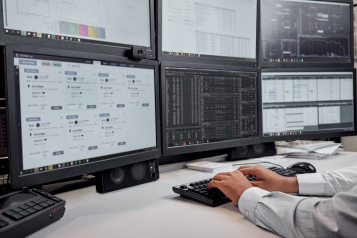
Distribution Network Operator - What is a DNO?
What is a DNO and are there alternatives you should know about? We take you through all you need to know about DNOs in the UK
Distribution Network Operators manage the electric power distribution system which delivers electricity to end users. But, what is a DNO, and what does DNO stand for? Here is what you need to know about them.
What does DNO stand for?
Distribution Network Operators (DNOs) are licensed companies that own and operate the network of cables, transformers and towers that bring electricity from the national transmission network to businesses and homes. Put simply, they are companies that are authorised to distribute electricity in the UK.
There are fourteen licensed geographically defined regions for electricity distribution, based on the former electricity board boundaries. However, six company groups hold the fourteen distribution licences for the specific geographical areas. These companies are:
- Electricity North West
- Northern Powergrid
- SP Energy Networks
- Scottish and Southern Electricity Networks (SSEN)
- UK Power Networks
- Western Power Distribution
Distribution Network Operators are regulated by Ofgem, the independent energy regulator in Great Britain. The primary purpose of Ofgem is to look after 'Relative Price Control' to protect consumers from being overcharged and to advocate for the rights of clients.
What is a DNO in comparison to electricity suppliers? DNOs are often confused with electricity suppliers, such as Octopus energy or EDF. The main difference is that electricity suppliers are companies that people choose to buy electricity from, whereas electricity distribution companies work on getting the electricity to homes and businesses. Some examples of reasons why the Distribution Network Operators would be contacted are:
- To report a power cut
- To receive help in an electrical emergency
- To connect a property to the electricity network
- To request network plans showing underground electricity cables
- To report the shroading of overhead lines
What are Independent Distribution Network Operators (IDNOs)?
IDNOs provide an alternative route for businesses that want to connect to the electricity grid in the UK. Both distributors have many similarities, starting from the main concept - they own, run and maintain electrical infrastructure. The main difference is that IDNOs operate nationwide, without regional restrictions, to manage local networks.
Independent Distribution Network Operators – such as Vattenfall IDNO – are still closely related to DNOs. They are both regulated by Ofgem, so they have the same work obligations and standards, making IDNOs responsible for any issues or maintenance on their networks.
However, there are also differences between the two types of distributors. An advantage of opting for an Independent Distribution Network Operator is that the business owner or a developer will receive an Asset Adoption Value for their existing electrical distribution assets (transformers for example), which can reduce the capital cost of connecting to the grid. The amount of the Asset Adoption Value is established by evaluating the value of assets and the expected load profile. DNOs cannot provide discounts in this way.
IDNOs are also generally more flexible, affordable and responsive to customer demands than DNOs. Read more about the differences between IDNOs and DNOs.
The Evolution of Distribution Network Operators
Distribution Network Operators (DNOs) emerged in the UK following the liberalisation of the energy market in the 1990s. Prior to this, regional electricity boards were responsible for generation, transmission, and distribution. The 1990 Electricity Act privatised these boards, creating a separate, market-driven entity for each function.
DNOs specifically handle the distribution of electricity from the transmission network to businesses and homes. Today, six company groups hold the fourteen licensees for distribution, each serving a specific geographical region.
Independent Distribution Network Operators (IDNOs) were introduced later to provide competition and flexibility in connection services. Unlike DNOs, IDNOs can operate nationwide, without regional restrictions.
Independent Connection Providers
Another important player related to DNOs and IDNOs is the Independent Connection Provider (ICP). ICPs are firms with NERS accreditation (National Electricity Registration Scheme) that carry out works on behalf of clients on the electricity networks, owned by DNOs and IDNOs.
DNOs are responsible for contestable and non-contestable works on the UK electricity grid. The quick definitions of these terms are:
- Non-contestable works - work which can only be conducted by a DNO.
- Contestable works – work that can be undertaken by an independent company, not just the DNO in the region.
Independent Connection Providers can complete contestable works on behalf of DNOs and IDNOs, such as cable jointing, installation of cables and network connections. This is particularly beneficial for consumers because it provides:
- Increased flexibility
- Quicker delivery
- More cost-effective grid connections
Read about the contestable and non contestable works that can be carried out by Independent Connection Providers.
How do DNOs and IDNOs generate income?
Both types of distributors receive their payments through the Distribution Use of System (DUoS) charges. DUoS charges are included in energy bills which you get from your energy supplier.
Distribution Network Operator regions
What does DNO stand for in the overall structure of electrical distribution in the UK? In the United Kingdom, the distribution of electricity from the national grid to end consumers is managed by Distribution Network Operators (DNOs). To ensure efficient management and operation, the country is divided into 14 geographical regions, each served by a DNO responsible for maintaining the local infrastructure and ensuring the delivery of electricity.
You can also use the Energy Networks Association website to find your local District Network Operator.



